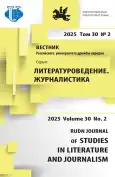Proverbs and Sayings of the Swahili Language in Written Discourse
- Authors: Shatokhina V.S.1
-
Affiliations:
- Russian State University for the Humanitaries
- Issue: Vol 30, No 2 (2025)
- Pages: 321-328
- Section: LITERARY CRITICISM
- URL: https://journal-vniispk.ru/2312-9220/article/view/319131
- DOI: https://doi.org/10.22363/2312-9220-2025-30-2-321-328
- EDN: https://elibrary.ru/JLKQAZ
- ID: 319131
Cite item
Abstract
Examines the peculiarities of the use of proverbs and sayings of the Swahili language in written discourse, especially in literature and modern media texts. Such a study is being conducted for the first time in Russian bantu studies. The aim to establish the fact of the use or absence of paremiological units in written texts in the Swahili language. The task is to clarify the features of the use of proverbs, as well as their relevance in selected literary works and media texts. The general thesis is put forward that the active use of paremiological units in the Swahili language is typical not only for oral discourse, but also for written. Proverbs and sayings allow the author not only to realize the decorative function of these phraseological units, but also to perform some more difficult, not always obvious tasks, for example, to endow the hero’s speech with great authority, which seems especially relevant in the context of the extremely respectful attitude of Swahili people to their ancestors and their statements. The presence of paroemias in literary works of various periods refutes the opinion that proverbs, being part of an archaic folklore stratum, often lose their relevance. Media texts skillfully use the allegorical function of proverbs and thereby make the text of articles and headlines sound even more vividly and accurately, which once again confirms the relevance of the use of paremiological units in modern texts, including in written discourse.
Keywords
About the authors
Victoria S. Shatokhina
Russian State University for the Humanitaries
Author for correspondence.
Email: viktoria_mamaafrika@mail.ru
ORCID iD: 0000-0002-9668-7710
SPIN-code: 6311-7064
Lecturer of Swahili language of the department of modern East and Africa, Faculty of Oriental and African Studies, Eurasian and Oriental Studies Institute
6 Miusskaya sq, Moscow, 125993, Russian FederationReferences
- Abakumova, T.G. (2015). Proverbs in the polemical discourse of the subject. Paremiology in discourse: General and applied issues of Paremiology. A proverb in discourse and in the text. The proverb and the linguistic picture of the world (pp. 67–83). Moscow: LENAND Publ. (In Russ.)
- Antonova, O.N. (2012). Functional properties of transformative paremias in English language journalistic discourse [Doctoral Dissertation]. Moscow. (In Russ.)
- Bochina, T.G. (2015). Dialogic character of the Russian parody. Paremiology in discourse: General and applied issues of Paremiology. A proverb in discourse and in the text. The proverb and the linguistic picture of the world (pp. 26–47). Moscow: LENAND Publ. (In Russ.)
- Bbcswahili. Instagram. Ukishangaa ya Musa utayaona ya Firauni. (In Swah.) https://www.instagram.com/tv/COjXLuxCeRX/?igshid=8gr5h2mgqi4a
- BBC News Swahili. Youtube. Hakuna kula ugali kwa mikono miwili. (In Swah.) https://www.youtube.com/channel/UCoerKKIKIMlDYaVFSTlsWGw
- Dw_kiswahili. Instagram. Mapenzi ni majani, huota popote. (In Swah.) https://www.instagram.com/dw_kiswahili/
- DW Kiswahili. Youtube. Ukitaka uzuri lazima udhurike. (In Swah.) https://www.youtube.com/channel/UCA_Fjr6R2D8BCPENte67Paw
- Idhaa ya Kiswahili. DW. Mtoto wangu, mlinzi wangu. (In Swah.) https://www.dw.com/sw/idhaa-ya-kiswahili/s-11588
- Konstantinova, A.A. (2012). Cognitive-discursive functions of proverbs and sayings in different types of discourse in English [Doctoral Dissertation]. Moscow. (In Russ.)
- Kezilahabi, E. (1990). Nagona. Dar es Salaam University Press Publ. (In Swah.)
- Kingei, K., & Ndalu, A. (2008). The Dictionary of Proverbs. Arts Limited Publ. (In Swah.)
- Matundura, B. (2004). The History of Liyongo the Brave. Phoenix Publishers (In Swah.)
- Mokienko, V.M. (2015). Aspects of Slavic Paremiology Research. Paremiology in discourse: General and applied issues of Paremiology. A proverb in discourse and in the text. The proverb and the linguistic picture of the world (pp. 4–26). Moscow: LENAND Publ. (In Russ.)
- Msuya, Sh.K. (1978). Chatting at Night. Tanzania Publishers House (In Swah.)
- Salla, H.D. (2017). The proverbs of our place. APE network Publ. (In Swah.)
- Spears, J. (1973). The Metaphor in American Folk Speech. Folklore, 29(1).
- Tegambwage, N. (1985). The shop in a village. Tausi Publ. (In Swah.)
- Wamitila, K.W. (1999). The power of a pray. Longhorn Publishers Ltd. (In Swah.)
Supplementary files









